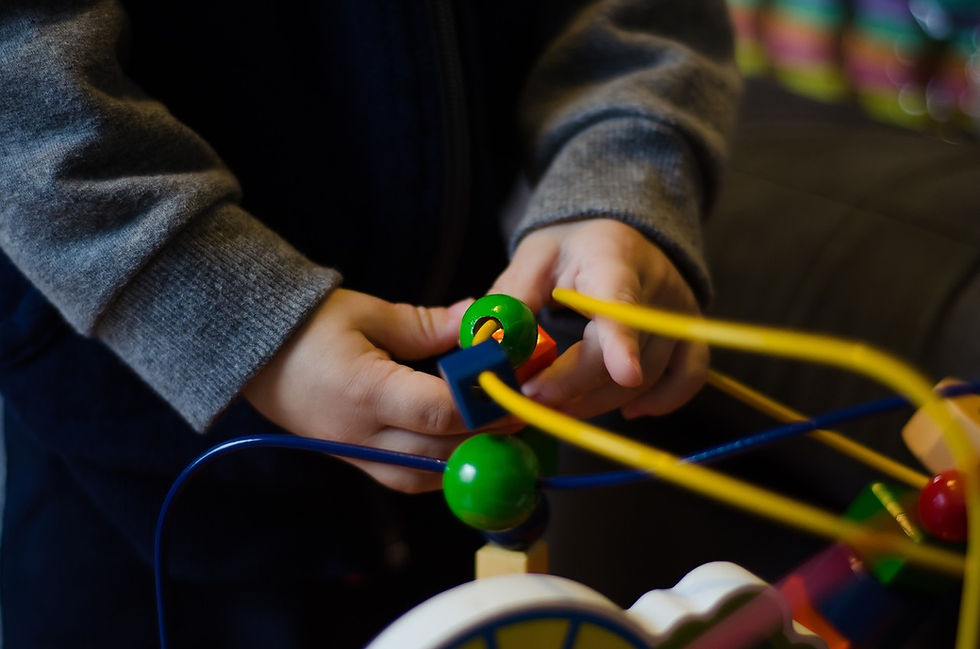Depression and Anxiety in Children and Teens
- childrens wellness center

- May 14, 2025
- 3 min read
Depression and anxiety are mental health conditions that have been on the rise among children and teens. Disturbing news, social media, peer pressures, and academic pressures are some of the factors contributing to mental health challenges in kids. It's important for families to regularly check in on how their children are doing, address any struggles their kids are going through, and help them get the right support and treatment. In this blog, we share information about depression and anxiety, how to spot the signs of these conditions, and what you can do to help your child.
Signs of Depression in Children and Teens
Depression is a mental illness that causes sadness for a prolonged period. While it's normal for kids to feel sad from time to time, depression lasts longer and can often occur for no specific reason. Signs include feeling down, irritability, loss of enjoyment in activities and hobbies, loss of appetite, low energy, low self-esteem, fatigue, and isolation. Kids with depression may struggle to keep up with their grades at school. They may also have a hard time sleeping or sleep longer than usual. Some teens might also engage in substance use to cope with depression. And, teen males will sometimes exhibit more anger.
Types of Depression
There are different types of depression. A common one is major depressive disorder, where you might notice persistent low moods and loss of interest in most activities for at least two weeks. Persistent depressive disorder involves chronic symptoms that are less severe but last for a year or more. Disruptive mood dysregulation disorder occurs when there are intense temper outbursts. Some female teens can suffer from premenstrual dysphoric disorder, which is a severe form of premenstrual syndrome.
Diagnosis and Treatment for Depression in Kids
Depression is diagnosed by a pediatrician or a mental health specialist, following a comprehensive evaluation. Typical treatment includes therapy with a mental health expert, medication, or a combination of both. The most common and effective types of therapy are cognitive behavioral therapy (CBT), which can help children manage their negative thoughts and develop coping skills, and interpersonal psychotherapy (IPT), where kids can talk through their relationship issues and learn how to improve their social skills. IPT is useful for handling grief, transitions, or conflict with family or peers. Some kids may need antidepressants, especially if their symptoms are prolonged or are significantly impacting their academics, social life, behavior, or self-esteem.
Anxiety Disorders in Kids
An anxiety disorder is another mental health condition that causes excessive and persistent fear or worry to the point that it interferes with daily life. Anxiety can have a negative impact on sleep, eating habits, relationships, academic performance, and self-confidence. Common symptoms include avoiding certain activities or social situations, trouble sleeping, difficulty with concentration, lower grades in school, headaches, and stomach aches.
There are several types of anxiety disorders, such as generalized anxiety, social anxiety, separation anxiety, and phobias. Generalized anxiety disorder involves excessive worry about everyday things, such as school or family issues. Kids with generalized anxiety disorder may constantly seek reassurance or may struggle to relax. Social anxiety disorder causes children to fear being judged or to worry about getting embarrassed or rejected in social situations. This can make it difficult for them to make friends or speak in class. Separation anxiety disorder causes kids to have an extreme fear of being separated from their parents or caregivers. While it's more common in younger children, it can also occur in older children. Phobias occur when kids have an irrational fear of a specific object or situation, such as being in the dark, needles, animals, heights, or storms.
Treating Anxiety in Children and Teens
Like depression, anxiety is diagnosed through an evaluation by a mental health professional or your pediatrician. Cognitive behavioral therapy can be effective for treating anxiety, as it helps children identify anxious thoughts and learn how to face their fears gradually in a safe environment. Exposure therapy, in particular, is used to help kids become less sensitive to their anxiety triggers. In some situations, medication may be needed alongside therapy.
Self-Harm and Suicide Prevention in Kids
Always keep in mind that signs of depression and anxiety should never be ignored. Early identification and treatment can make a big difference. If left untreated, depression and anxiety can affect your child's emotional and physical development. It can also lead to thoughts of suicide and harmful behaviors. If you believe your child is at risk for suicide or self-harm, get them help right away. Call or text 988 or use the chat feature at 988lifeline.org for 24/7 free and confidential support. For more information on suicide prevention, check out our blog here.
If you believe your child needs a mental health evaluation or if you have any concerns, don't hesitate to call our office.







Comments